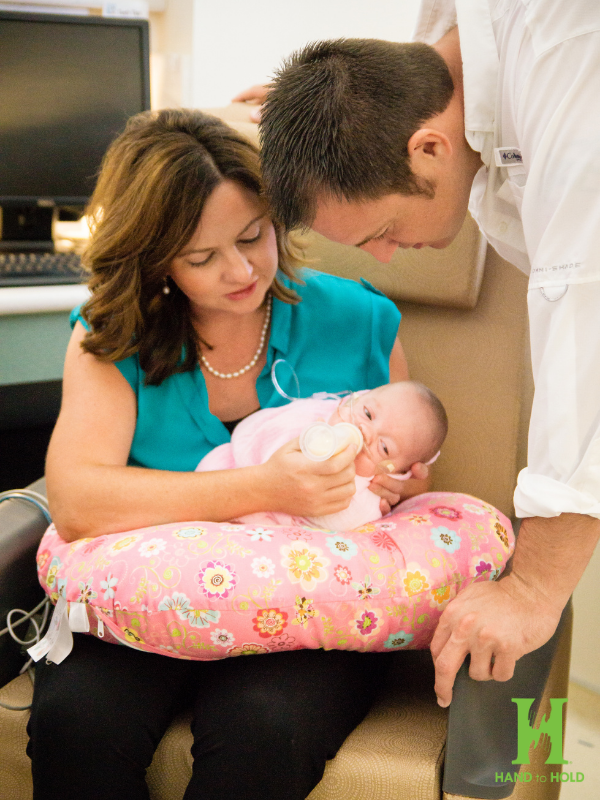by Anne Boon, MS, CCC-SLP
After being intubated with a breathing tube for so many months Bryce’s ‘suck muscles’ were weak and trying to feed from the bottle took so much energy that he would tire out before filling his belly. We supplemented tube feedings by way of an NG tube for weeks while trying to build his eating strength and coordination…But as time wore on it became obvious that if we didn’t take Bryce home with a feeding tube we would remain in the NICU for the forseeable future…so we swallowed our fears and began our NG placement training. There is really nothing worse in our books than holding your infant son down while shoving a tube up his nose, down his throat and into his tummy…It’s easy to laugh off the stress of the ordeal as we look back now but it really was a true test for us. Now we compare all things to the torture of placing an NG tube–ALL things.” – Katrina Moline, Mom to Bryce, born at 24 weeks. Read more from Katrina’s original blog post.

Courtesy of the Whitaker Family
Premature birth has many effects on infant health, development and behavior – and feeding difficulties are no exception. Not only does feeding present an issue during the first weeks, months and year of a premature baby’s life, it can be an ongoing issue for many families for years thereafter. Thankfully, skilled health care professionals can help support you and help your baby continue to develop the feeding skills they need to grow and thrive.
Feeding disorders defined
A feeding disorder of infancy or early childhood is characterized by the failure of an infant or child under six years of age to eat enough food to gain weight and grow normally over a period of one month or more. Some families will experience minor feeding issues. Others may need a team of professionals to help identify problems and intervene appropriately.
Structural or physiological?
Feeding difficulties can generally be divided into those that result from structural problems or those that are physiological. In layman’s terms, feeding issues can stem from a medical condition or persisting developmental issue, or be a learned behavior left over from the NICU. Gastrointestinal issues, such as reflux or poor gastric emptying, are examples of physiological reasons that a baby may have difficulties eating. If gastrointestinal comfort and readiness are not present and your baby’s food intake is increased to promote weight gain, this situation can increase physical pain and discomfort a baby associates with eating. The long-term result of this imbalance can be oral aversion and defensiveness around mealtimes and eating. Consider Kathryn Whitaker’s experience with her son, Luke, who was born at 36 weeks and was previously diagnosed with a surgical case of necrotizing enterocolitis.
“When it came time for baby food post-NICU, Luke lapped that up, eating every new flavor introduced. When he turned one, we made the transition to table food and began seeing signs of oral aversion, sensory challenges and some marked weight loss. His gastroenterologist prescribed an oral supplement along with a calorie enhancer. For many months we flirted with G-tube insertion. While the supplement helped him put on necessary weight, it was complicated by his tender and immature bowels, illness and more oral aversion. He began throwing up at every meal, at the sight of food and when touching various textures. Mealtime has become a constant and very wearing struggle…we fight to get him to eat every cracker, every piece of fruit, every vegetable and every bite of meat.” Read more from Kathryn’s original blog post.
READ: Coping When Your Baby has Reflux or GERD – a resource from Zero to Three
What is feeding therapy?
 The first step before feeding therapy can begin is to discuss the critical questions as to why your baby is having feeding difficulties. Feeding therapy could involve oral-motor therapy to address weak muscles in and around your child’s mouth, a behavioral feeding plan, or elements of both. A speech-language pathologist may be one of the team members to help your child learn to enjoy meal times again. But you may need to involve other medical professionals in your child’s treatment as well.
The first step before feeding therapy can begin is to discuss the critical questions as to why your baby is having feeding difficulties. Feeding therapy could involve oral-motor therapy to address weak muscles in and around your child’s mouth, a behavioral feeding plan, or elements of both. A speech-language pathologist may be one of the team members to help your child learn to enjoy meal times again. But you may need to involve other medical professionals in your child’s treatment as well.
Sometimes babies will be evaluated by a team of health care professionals including, but not limited to, a gastroenterologist, registered dietician, pulmonologist, cardiologist, neurologist, lactation consultant and either a speech-language pathologist or an occupational therapist. This is an ideal way to form an integrated treatment approach that will address your baby’s multiple issues that affect feeding. Other times you will experience an evaluation by a speech- language pathologist or an occupational therapist who will compile information from all of you child’s medical specialists listed above in a thorough case history questionnaire.
Watch this video: Preemie Nutrition: Nutritional Needs & Fortification
Feeding tips upon release from the NICU
The following “STEPS” pneumonic will help you with feeding difficulties after your child has been released from the NICU.
S – Swaddle your baby during feedings. This will give your baby postural control and support while they eat so they can focus on the “workout” of eating rather than how to stabilize or control his/her body.
T – Touch your baby. Some people call this Kangaroo Care. Make sure you spend as much time as you can in skin-to-skin contact with your baby. This goes for both parents!
E – Evaluate the flow of milk from the nipple or your breast. Avoid using high flow nipples and if the natural flow of your breast milk is fast, try pumping a few minutes prior to beginning the feeding.
P – Pace your baby. Recognize signs of stress, such as increased work of breathe, furrowed eyebrows, coughing, red/watery eyes, and loss of liquid around the mouth. Be sure you give your baby the breaks he/she needs to breathe.
S – Position your baby in an elevated sidelying position. This feeding position will decrease breathing effort, improve head and trunk alignment and allow for the liquid to collect in the cheek prior to the swallow.
Finding a feeding program or therapist
If you are followed by a developmental pediatrician or primary care physician, inquire about professionals in your area that have expertise in infant feeding disorders. You many also contact therapy clinics or pediatric hospitals in your area, and ask if their speech-language pathologists or occupational therapists have expertise in infant feeding disorders.
About Anne Boon
Anne Boon, MS, CCC-SLP is a licensed Speech-Language Pathologist working at Dell Children’s Medical Center of Central Texas. She has consulted within the Leander Independent School District, worked in private practice in Cedar Park, Texas, as well as at Our Children’s House at Baylor Medical Center in Dallas, Texas. She has worked with numerous children with feeding difficulties and on multidisciplinary teams of health professionals to help these children reach their goals. She did her undergraduate work at The University of Texas at Austin and earned a Master’s degree from The University of Texas at Dallas. Contact her at annelboon@gmail.com.
